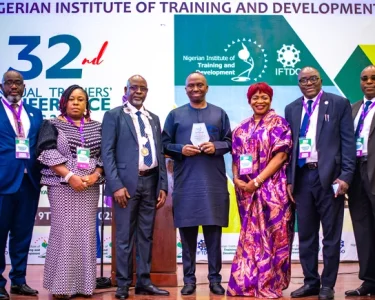Nigeria and Africa need to adopt a unified, governance-driven approach to AI development, where trust, regulation, and cybersecurity are more important than ever.
Speakers after speakers recently in Lagos at the 2025 Africa’s Beacon of ICT Merit and Leadership Award (ABoICT 2025), reflected and echoed the same sentiment, and that: AI without governance is a ticking time bomb.
In an address, Chief Visionary Officer of Digital Encode, Professor Adewale Obadare while harping on the topic, AI Governance, Standardization and Cybersecurity in the AI Era, warned against the rising trend of “AI washing”-where companies label basic software or services as “AI” to capitalize on hype, often without the underlying technological integrity or oversight.
“People are calling everything AI today, from photography apps to basic automation, but no one is talking about AI governance,” he said.
Drawing comparisons to the early days of the internet, Obadare cautioned that failing to integrate security and governance into AI architecture could lead to far-reaching consequences. “We are repeating the same mistake we made with TCP/IP, which was not built with cybersecurity in mind. We cannot afford to make that error again.”
He emphasized that governance should not be seen as a hindrance but as an enabler of safe innovation. “Governance is not a brake to stop movement; it is a brake to make movement safe,” he said.
Citing international standards like ISO/IEC 42001 and ISO/IEC 38507, Obadare called for responsible innovation grounded in clear ethical guidelines, stressing the importance of securing the core components of AI: data, models, and infrastructure.
Echoing similar concerns, Chief Operating Officer, Spectranet, Amrich Singhal, in his presentation themed “Responsible AI and Nigeria: Balancing Innovation, Regulation, and Cybersecurity,” stressed that “the countries that will benefit most from AI are not necessarily those with the most powerful models, but those with the most trusted systems.”
Singhal painted AI as a double-edged sword, capable of boosting national productivity while also enabling new forms of cyber manipulation—from deepfakes to identity theft and disinformation. “AI can clone voices, create fake personas, and even undermine democracy. It’s no longer a question of readiness, it’s a question of urgency,” he declared.
He acknowledged Nigeria’s potential due to its youthful, tech-savvy population and its expanding use of AI across sectors like healthcare, agriculture, education, and oil exploration.
However, he criticized existing regulatory structures such as the Nigeria Data Protection Regulation (NDPR) and NITDA’s 2023 draft AI framework as being “underdeveloped, underfunded, and poorly enforced.”
Obadare warned of real-world failures, such as Microsoft’s racist chatbot Tay, Amazon’s gender-biased recruitment AI, and Uber’s fatal autonomous vehicle incident, not as tech failures, but as governance failures.
He also cited cybersecurity breaches, including the 2023 hacking of OpenAI’s ChatGPT and the leak of DeepSeek’s API keys and user data on launch day, to stress that “the danger is not just in the algorithms, but in how we design and deploy them.”
The Spectranet chief proposed a three-tiered strategy to build Nigeria’s AI resilience: government must champion AI education, create safe innovation sandboxes, and enforce data laws; private companies must adopt ethical and secure design practices; and civil society must raise awareness of digital rights and AI risks-especially for vulnerable populations.




